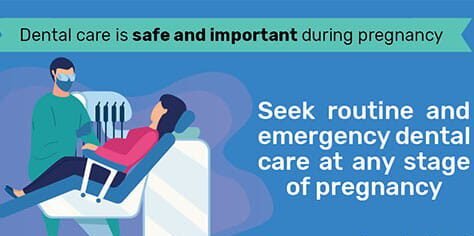Physical Address
304 North Cardinal St.
Dorchester Center, MA 02124
Physical Address
304 North Cardinal St.
Dorchester Center, MA 02124

Discover what you need to know about dental care during pregnancy.
Maintaining good oral health during pregnancy is crucial for both the mother and the baby. Pregnancy brings about hormonal changes in the body that can increase the risk of certain dental problems. In fact, studies have shown that pregnant women are more susceptible to gum disease, tooth decay, and other oral health issues.
Gum disease, in particular, has been linked to complications during pregnancy, including preterm birth and low birth weight. This is why it is imperative for pregnant women to prioritize their dental care. Regular dental check-ups and cleanings, along with a thorough oral hygiene routine at home, can help prevent and treat these problems.
Moreover, untreated dental issues during pregnancy can pose risks not only to the mother but also to the developing baby. Dental infections, if left untreated, can potentially spread throughout the body and affect the overall health of both the mother and the fetus. By prioritizing dental care and seeking professional treatment as needed, expecting mothers can reduce the chances of such complications and ensure the best possible outcomes for their oral and overall health.

During pregnancy, women may experience several dental problems that can be attributed to hormonal changes in the body. One common issue is pregnancy gingivitis, which is characterized by red, swollen, and tender gums. This condition occurs due to an increased level of progesterone, which can lead to an exaggerated response to plaque buildup on the teeth. As a result, pregnant women may experience bleeding gums while brushing or flossing.
Another dental problem that expecting mothers may face is tooth decay. This occurs when there is a lack of proper oral hygiene or an excessive intake of sugary foods and drinks. Pregnancy cravings and morning sickness can contribute to an increased consumption of sugary substances, putting women at a higher risk of developing tooth decay. Furthermore, if morning sickness leads to frequent vomiting, the stomach acid can erode the tooth enamel, making the teeth more susceptible to decay.
It is crucial for pregnant women to address these dental problems promptly, as they can have detrimental effects on both the mother’s and baby’s oral health. Neglected dental issues can lead to more severe conditions such as advanced gum disease or even tooth loss. Moreover, research has shown that periodontal disease during pregnancy may increase the risk of premature birth or low birth weight. Therefore, maintaining good oral hygiene and seeking professional dental care are essential steps for expecting mothers to ensure their overall health and the health of their baby.
| Dental Problem | Description |
|---|---|
| Gingivitis | Inflammation of the gums, often characterized by redness, swelling, and tenderness. |
| Periodontal Disease | Advanced form of gingivitis, involving the inflammation and infection of the gums and surrounding structures. |
| Pregnancy Tumors | Benign growths on the gums, usually appearing in the second trimester. |
| Tooth Decay | Increased risk due to hormonal changes and dietary habits during pregnancy. |
| Enamel Erosion | Acidic erosion of tooth enamel, which may be exacerbated by morning sickness or dietary changes. |
| Tooth Mobility | Weakening of the tooth’s support structures, sometimes due to hormonal changes and increased blood flow. |
| Dry Mouth | Reduction in saliva production, leading to discomfort and increased risk of tooth decay. |
| Increased Sensitivity | Some pregnant individuals experience increased sensitivity to hot, cold, or sweet foods. |
| Oral Infections | Increased susceptibility to oral infections due to hormonal changes and compromised immunity. |
| Pregnancy-associated Gingivitis | A condition specifically linked to hormonal changes during pregnancy, causing gum inflammation. |
Hormonal changes during pregnancy not only affect a woman’s body but also have an impact on her oral health. These changes can lead to an increased risk of certain dental problems and may require additional attention and care. One of the main hormones responsible for these changes is progesterone, which is produced in higher levels during pregnancy.
The elevated progesterone levels can cause an exaggerated response to plaque in the mouth, leading to an increased risk of gum inflammation and gingivitis. This condition, known as pregnancy gingivitis, is characterized by red, swollen, and sensitive gums that may bleed easily. It is important to note that hormonal changes alone do not cause gum disease, but they can make the gums more susceptible to bacterial growth and infection.
During pregnancy, hormonal changes in the body can have a significant impact on a woman’s oral health. One common dental problem that is experienced by many pregnant women is gum disease. The link between pregnancy and gum disease is well-established, with studies indicating that hormonal changes during pregnancy can make women more susceptible to developing gum disease.
The increased levels of progesterone in the body during pregnancy can lead to an exaggerated response to the bacteria that naturally occur in the mouth. This can result in inflammation and bleeding gums, also known as gingivitis. If left untreated, gingivitis can progress to a more serious form of gum disease called periodontitis, which can ultimately lead to tooth loss.
It is important for pregnant women to be aware of the link between pregnancy and gum disease and take proactive measures to maintain good oral health. This includes regular dental check-ups and cleanings, practicing good oral hygiene at home, and being mindful of any changes in the gums or teeth. Seeking professional dental care during pregnancy is essential to address any dental issues and ensure the health and well-being of both the mother and the baby.
Untreated dental issues during pregnancy can have serious implications for both the mother and baby. Research has shown a strong link between poor oral health during pregnancy and various complications, such as preterm birth, low birth weight, and preeclampsia. These risks arise from the body’s natural inflammatory response to oral infections, which can spread throughout the body and affect pregnancy outcomes.
One of the most common dental issues during pregnancy is gum disease, also known as periodontal disease. Hormonal changes during pregnancy can make women more susceptible to gum disease, causing symptoms like redness, swelling, bleeding, and tenderness of the gums. If left untreated, gum disease can progress and lead to tooth loss. Moreover, the bacteria responsible for gum disease can enter the bloodstream and potentially affect the developing fetus, increasing the risk of complications.
Addressing dental issues during pregnancy is crucial for maintaining oral and overall health. Regular dental check-ups and cleanings can help detect and treat any problems early on. Dentists can also provide safe treatment options and procedures that are suitable for pregnant women. It is important for expecting mothers to prioritize their dental care during pregnancy to ensure a healthy smile and reduce the risks associated with untreated dental issues.

During pregnancy, it is important to prioritize both the health of the mother and the growing baby. Many women may have concerns about receiving dental treatments or procedures during this time, but rest assured that there are safe options available.
Routine dental care such as cleanings and check-ups are generally considered safe during pregnancy. Regular visits to the dentist can help prevent and address any potential dental issues, reducing the risk of complications. However, it is essential to inform your dentist about your pregnancy so that they can take the necessary precautions, such as avoiding certain medications or adjusting the treatment plan if needed.
In cases where more extensive dental work is required, such as fillings or root canals, it is generally recommended to postpone non-urgent procedures until after giving birth. However, if there is a pressing need for treatment, your dentist will work closely with your obstetrician to determine the best course of action, weighing the risks and benefits to ensure the safety of both you and your baby.
Remember that maintaining good oral hygiene at home, including brushing twice a day with a fluoride toothpaste and flossing daily, is crucial during pregnancy. Proper oral care can help prevent dental issues and promote overall oral health. Additionally, a balanced diet rich in nutrients, such as calcium and vitamin D, can support strong teeth and gums.
In conclusion, while it is important to prioritize your oral health during pregnancy, it is equally vital to ensure the safety of both the mother and the baby. By staying proactive and working closely with your dental and medical professionals, you can receive safe dental treatments and procedures that will help maintain a healthy smile throughout your pregnancy journey.
When considering medications and anesthesia during pregnancy, it is crucial to prioritize the health and well-being of both the mother and the developing baby. While some medications may be safe to use during pregnancy, it is important to consult with your healthcare provider before taking any medications, including over-the-counter drugs. They can provide guidance on the safety and potential risks associated with specific medications.
It is worth noting that certain dental procedures may require the use of anesthesia. In these cases, it is essential to inform your dentist about your pregnancy to ensure the appropriate anesthesia options are chosen. Local anesthesia is generally considered safe during pregnancy, as it is administered directly to the area being treated and does not affect the entire body. However, general anesthesia, which renders a person unconscious, is typically avoided whenever possible during pregnancy. Your dentist will work with you to determine the safest and most effective approach for any necessary dental treatments.
| Category | Considerations |
|---|---|
| Medications | – Safety: Consider the safety profile of the medication during pregnancy. Consult healthcare provider for guidance. |
| – Risk vs. Benefit: Evaluate the potential risks of the medication against the benefits it offers for the health condition. | |
| – FDA Category: Consider FDA pregnancy categories (A, B, C, D, X) if available, but note that they may not always reflect current knowledge. | |
| – Timing: Be mindful of the trimester in which the medication is administered, as risks may vary during different stages of pregnancy. | |
| – Alternative Therapies: Explore non-pharmacological alternatives or safer medications whenever possible. | |
| – Consultation: Always consult a healthcare provider or obstetrician before taking any medication during pregnancy. | |
| Anesthesia | – Anesthetic Agents: Certain anesthetic agents may cross the placenta, potentially affecting the fetus. Consider agents with lower placental transfer when possible. |
| – Monitoring: Ensure adequate monitoring of maternal vital signs and fetal well-being during anesthesia administration. | |
| – Anesthesiologist Consultation: Consult with anesthesiologists experienced in managing pregnant patients for personalized anesthesia plans. | |
| – Preoperative Assessment: Conduct a thorough preoperative assessment to identify any pre-existing conditions that may affect anesthesia administration. | |
| – Postoperative Care: Provide appropriate postoperative care to manage any potential complications or side effects of anesthesia. | |
| – Regional vs. General Anesthesia: Depending on the procedure and maternal health status, consider the benefits and risks of regional vs. general anesthesia for the mother and fetus. |
Maintaining a healthy oral hygiene routine is especially important during pregnancy to ensure the overall well-being of both the mother and the baby. Hormonal changes that occur during pregnancy can increase the risk of oral health problems such as gum disease and tooth decay. Therefore, it is crucial for expecting mothers to prioritize their dental care.
Regular brushing and flossing are the foundation of a solid oral hygiene routine. It is recommended to brush at least twice a day using a soft-bristled toothbrush and fluoride toothpaste. Flossing should be done daily to remove plaque and food particles from between the teeth and along the gumline. In addition to brushing and flossing, using an antimicrobial mouthwash can provide extra protection against bacteria that may cause gum disease.
Pregnant women should also maintain regular dental check-ups and cleanings. Routine dental visits not only help in detecting and treating dental problems early on, but they also enable dental professionals to provide guidance and advice on maintaining good oral health during pregnancy. It is safe to undergo routine dental procedures such as cleanings and X-rays during pregnancy, as long as the dentist is aware of the pregnancy and takes necessary precautions to ensure the safety of both the mother and the baby.
In conclusion, maintaining a healthy oral hygiene routine is of utmost importance during pregnancy as it can help prevent dental problems and promote overall health. Regular brushing, flossing, and dental visits are key components of a proper oral care routine. By prioritizing oral health, expecting mothers can ensure the best possible outcomes for themselves and their babies.
Eating a well-balanced diet is crucial for maintaining excellent overall health during pregnancy, including dental health. Ensuring that you consume foods rich in essential nutrients can support the health of both your teeth and gums. Calcium, for example, is essential for maintaining strong teeth and bones. Incorporate dairy products like milk, cheese, and yogurt into your diet to ensure an adequate intake of calcium. Additionally, foods rich in vitamin D, such as fatty fish (salmon, mackerel) and egg yolks, can help in calcium absorption.
It’s also important to prioritize foods that contain vitamin C, which can aid in the prevention of gum disease. Citrus fruits like oranges and strawberries are excellent sources of vitamin C. Including a variety of fruits and vegetables in your diet will not only provide you with essential vitamins and minerals but also help stimulate saliva production, which can neutralize acids and protect against tooth decay. Lastly, staying hydrated by drinking plenty of water is crucial for oral health. Water helps wash away food particles and bacteria and promotes saliva production, which naturally fights against tooth decay.

Morning sickness is a common occurrence during pregnancy that can pose challenges for maintaining oral health. The nausea and vomiting associated with morning sickness can increase acidity levels in the mouth, leading to tooth enamel erosion and an increased risk of cavities. Furthermore, the strong aversions to certain tastes and smells that often accompany morning sickness can make it difficult to brush and floss regularly.
To overcome these challenges, there are several strategies that pregnant women can employ. First and foremost, it is important to rinse your mouth with water or a fluoride mouthwash after vomiting to help neutralize the acids and protect the teeth. Using a toothpaste with added fluoride can also be beneficial in remineralizing the enamel and preventing tooth decay.
Additionally, choosing milder-flavored toothpaste options or using a baking soda and water mixture for brushing can help mitigate any aversions to taste. Endeavoring to brush at least twice a day and floss daily, even if it requires finding alternative times or positions that are more comfortable, is crucial for maintaining good oral hygiene during pregnancy. Seeking advice from a dentist can provide personalized tips and guidance for managing morning sickness and maintaining dental health throughout pregnancy.
Tooth development in a baby begins long before they are born, and pregnancy plays a crucial role in this process. The nutrients a mother consumes during pregnancy are essential for the development of the baby’s teeth, as well as their overall health. Adequate intake of calcium, phosphorus, vitamin D, and other essential vitamins and minerals are vital for proper tooth formation.
Research suggests that poor maternal oral health during pregnancy can have a long-lasting impact on the baby’s teeth. Studies have found a correlation between mothers with untreated dental issues, such as gum disease or tooth decay, and an increased risk of their children developing similar problems later in life. This can be attributed to the transmission of harmful bacteria from the mother to the baby, resulting in an increased susceptibility to oral health issues.
It is important for expecting mothers to understand the significance of their oral health during pregnancy and its potential impact on their baby’s tooth development. By maintaining good oral hygiene practices, visiting the dentist regularly, and consuming a nutritious diet, mothers can help promote healthy tooth development in their babies while also safeguarding their own oral health.
Maintaining good oral health is particularly important during pregnancy as hormonal changes can increase the risk of dental problems. Regular dental check-ups and cleanings are recommended for expecting mothers to prevent and address any issues that may arise. Additionally, practicing proper oral hygiene, such as brushing twice a day for two minutes and flossing daily, is crucial for maintaining a healthy mouth.
It is also essential for pregnant women to pay attention to their diet for dental health. Consuming a balanced diet rich in vitamins and minerals, particularly calcium and vitamin D, can support healthy teeth and gums. Avoiding sugary and acidic foods and drinks can help prevent tooth decay and enamel erosion. Additionally, staying hydrated by drinking plenty of water can also contribute to good oral health.
When it comes to seeking professional dental care during pregnancy, it is crucial to prioritize both the mother’s oral health and the baby’s overall well-being. Regular dental check-ups and cleanings are recommended throughout pregnancy to ensure that any potential dental issues can be addressed promptly. By visiting a dentist who specializes in maternal oral health, expectant mothers can receive proper guidance and treatment tailored to their unique needs.
Seeking professional dental care during pregnancy not only helps maintain oral health but also reduces the risks associated with certain dental problems. The hormonal changes experienced during pregnancy can make women more susceptible to gum disease, tooth decay, and other oral health issues. Consulting with a dental professional can help identify and treat these conditions early on, preventing further complications that may arise during pregnancy. Additionally, a dentist can provide valuable advice on maintaining a healthy oral hygiene routine and offer tips on nutrition to support optimal dental health during this critical time.
Yes, it is generally safe to undergo dental treatments during pregnancy, as long as certain precautions are taken and the dentist is aware of your pregnancy.
Yes, hormonal changes during pregnancy can have an impact on oral health, potentially leading to gum inflammation and an increased risk of gum disease.
Common dental problems during pregnancy include gum inflammation, pregnancy gingivitis, tooth decay, and pregnancy tumors.
Pregnancy does not directly affect tooth development in the baby. The baby’s teeth begin to form during the first trimester of pregnancy, before any dental issues may arise.
Untreated dental issues during pregnancy can potentially lead to complications such as gum disease, tooth decay, and even preterm birth or low birth weight.
It is important to continue regular brushing and flossing during pregnancy. Using a soft toothbrush and an antimicrobial mouthwash can also help maintain oral hygiene.
Consuming a balanced diet rich in vitamins and minerals, particularly calcium, vitamin D, and vitamin C, can support dental health during pregnancy.
Rinsing your mouth with water or a fluoride mouthwash after vomiting can help neutralize stomach acid and protect your teeth. Using a mild, flavored toothpaste may also help reduce nausea.
It is important to consult with your dentist and obstetrician before taking any medications or undergoing dental procedures that involve anesthesia during pregnancy.
It is recommended to seek professional dental care during pregnancy for routine check-ups and cleanings. Additionally, if you experience any dental pain or notice changes in your oral health, it is important to consult with a dentist.